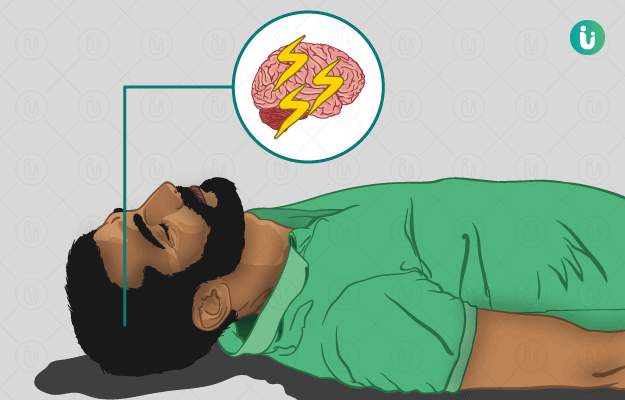What are seizures?
Seizures, commonly termed as fits or convulsions, are a manifestation of physical findings and behavioural changes caused by sudden, multiple abnormal electrical discharges in the brain.
What are its main signs and symptoms?
Focal and generalised seizures, the two main types of seizures, are characterised by symptoms as below:
Focal seizures originate from one particular part of the brain. Symptoms associated with focal seizures are:
- Sudden movement of any one part of the body
- Change in consciousness resulting in repetitive movements and activities
- Auras may be experienced
- Hearing, smelling or tasting things that are not real
Symptoms associated with generalised seizures include:
- Absence seizures: More common in children, where they may appear to be staring at an empty space or may have a brief loss of awareness along with subtle body movements.
- Tonic seizures: Stiffness of muscles that may cause a fall. It is more common for the muscles of the back, arms and legs to be affected.
- Clonic seizures: Jerky muscular movements, more commonly affecting the muscles of the face, neck and arms.
- Tonic-clonic seizures: One may experience a combination of the symptoms of tonic seizures and clonic seizures.
- Myoclonic seizures: Short jerky movements along with muscle twitching
- Atonic seizures: One may collapse or fall due to loss of muscle control.
What are the main causes?
Like most neurological conditions, the clear cause of a seizure is unknown. The condition epilepsy is, however, the most common cause.
Other causes include:
- Genetic factors: Gene mutations or genetic inheritance plays a key role in the occurrence of seizures
- Brain tumours, trauma to the head, neurological developmental conditions, inflammation of the brain or Alzheimer’s disease
- Infections
- Human immunodeficiency virus (HIV) infection
- Alcohol and drug abuse
- Sleep deprivation, fever
- Certain medications like antidepressants, diuretics and analgesics
How is it diagnosed and treated?
A thorough medical history, along with a number of investigations, aid in diagnosing seizures.
- Blood tests to detect infections, genetic disorder, hormonal or electrolyte imbalance.
- Lumbar puncture
- Electroencephalogram
- Neurological function tests
- Magnetic resonance imaging (MRI)
- Positron emission tomography (PET) scan
Seizures may sometimes be a single occurrence and may not require any treatment.
If repetitive episodes of seizures occur, the doctor may prescribe anti-epileptic medications. Surgery may be required in certain cases. Diet modifications such as a high-fat, low-carbohydrate, ketogenic diet help in seizure treatment.

 Doctors for Seizures
Doctors for Seizures  OTC Medicines for Seizures
OTC Medicines for Seizures



















